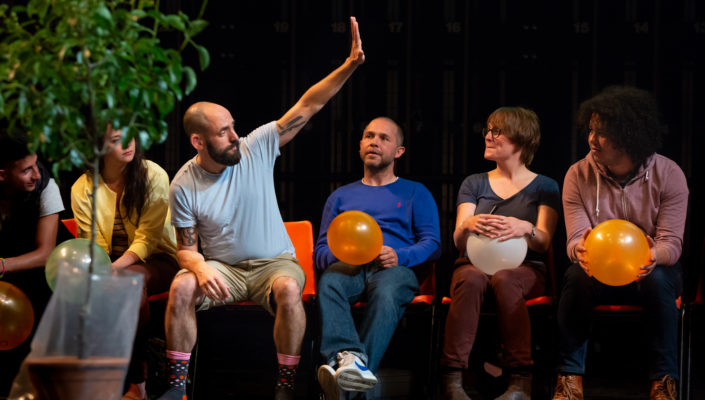English

How we made it
English turned out to be one of the most challenging experiences in our history of making work. Not particularly because of the process of making the work itself – a complex but often joyful collaboration with the fabulous Jonny Cotsen – but because of the political furore that surrounded the project, focussing on the problem of English or non-Wales-based artists making work for National Theatre Wales and rotating around the title we’d chosen – “English”. All but two of our team of ten making the work either then lived in or had grown up in Wales, but that wasn’t the point. Quarantine is based in Manchester and the title stirred an historically angry nest. The debate, conducted online and in the media, was an important one, despite its tone and targets – frequently the then recently appointed Artistic Director of NTW, our longstanding colleague and collaborator, Kully Thiarai – straying into heated and personal territory. We regret that happened to Kully, though of course, she’s a brilliant, robust and well-loved leader who’s since gone on to make great things happen with the Leeds 2023 festival….
We’d chosen the title because our original intention had been to make a piece of work about language itself, and an idea to look at how migrants in Wales (particularly in South Wales) often then had limited opportunities to learn Welsh. In some ways, the plan had been to raise some of the very problems that the debate focussed on. However, as we moved further into our research, our focus shifted. Crucially, when we met Jonny - a deaf, Jewish, Welsh, ex-graphic designer, football fan and dad-turned-performance maker – we decided to work with him and to look at language and identity from a different set of angles. We stuck with the original title – in hindsight, a bad decision.
The show invited its audience into a conversation about language with Jonny. It was a performance built out of a fascination with what happens when we try to talk about how to live together. Its form was an A to Z of language and identity, including D/deaf culture and politics – made in Wales, but with the global perspective that came with Jonny’s complex experience and identity. Pulling pop songs apart, tearing grammar to pieces and inviting all the languages in the room to be heard. An intimate, provocative encounter, English asked how language shapes us all and what happens to our sense of self when we don’t really know how to say who we are.
It was a flawed work, scrutinised with a heightened critical eye. Because of the controversy surrounding it, perhaps indeed because it wasn’t rich enough, it didn’t go on to have the life we’d planned for it….
Richard Gregory
English was produced by National Theatre Wales and Quarantine, and premiered with Wales Millennium Centre as part of Festival of Voice 2018
Concept & Direction: Richard Gregory
Dramaturgy: Renny O'Shea
Performer/Collaborating Artist: Jonny Cotsen
Collaborating Artist/Text: Sonia Hughes
Collaborating Artist/Choreography: Jo Fong
Design: Simon Banham
LX Design: Mike Brookes
Production Manager: Greg Akehurst
Project Assistant: Kate Daley
Producer: Ali Dunican
Dates
PAST PERFORMANCES
Wales Millennium Centre, Cardiff | 14 – 24 June 2018
Toggle